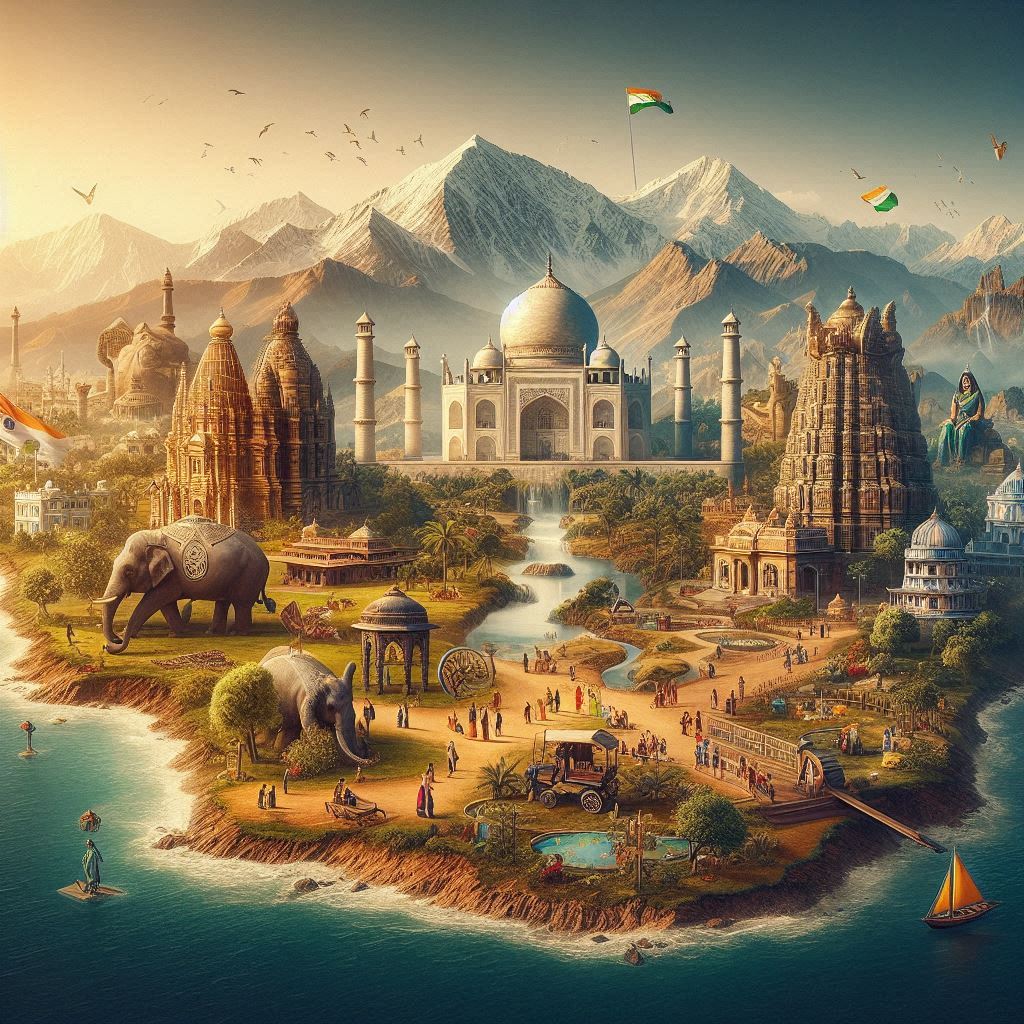Incredible India Tourism
Why India is Known as Incredible India
Incredible India Tourism, a country often referred to as “Incredible India,” is a mesmerizing land of diversity and wonder. It stands out on the global stage due to its unique blend of cultures, languages, religions, and landscapes. This article explores the various facets that make India a truly incredible destination for travelers and explorers from around the world.
A Tapestry of Cultural Richness
India’s rich heritage and cultural diversity are unparalleled. The country is home to numerous religions, including Hinduism, Islam, Christianity, Sikhism, Buddhism, and Jainism, all of which coexist peacefully. Each region of India has its own distinct traditions, festivals, and customs, creating a vibrant tapestry of cultural experiences. Visitors can immerse themselves in the colorful festivals, such as Diwali, Holi, Eid, and Christmas, which are celebrated with great fervor across the nation.
Architectural Marvels: A Glimpse into India’s History
India’s architectural heritage is a testament to its rich history. The country boasts a plethora of historical monuments, temples, forts, and palaces that reflect the grandeur of its past. The Taj Mahal, a UNESCO World Heritage Site and one of the Seven Wonders of the World, is a symbol of love and a masterpiece of Mughal architecture. Other notable sites include the ancient caves of Ajanta and Ellora, the majestic forts of Rajasthan, and the intricate temples of Tamil Nadu.
Natural Beauty: From the Himalayas to the Indian Ocean
India’s diverse geography offers a wide range of natural attractions. The northern part of the country is dominated by the majestic Himalayan mountain range, which provides breathtaking views and opportunities for trekking, mountaineering, and skiing. The southern coastlines are fringed with golden beaches, such as those in Goa and Kerala, where visitors can relax and soak up the sun. India’s rich biodiversity is evident in its numerous national parks and wildlife sanctuaries, including Ranthambore, Kaziranga, and Jim Corbett, where rare and endangered species like the Bengal tiger and Indian rhinoceros can be spotted.
Rivers and Waterways: The Lifeblood of India
India’s rivers, such as the Ganges, Yamuna, Brahmaputra, and Godavari, play a crucial role in the country’s cultural and spiritual life. The Ganges River, in particular, is considered sacred by Hindus and is a focal point for religious rituals and ceremonies. The backwaters of Kerala offer a unique experience, where visitors can explore serene waterways on traditional houseboats, surrounded by lush greenery and coconut groves.
The Spirit of Atithi Devo Bhava: Hospitality in India
The ancient Indian philosophy of “Atithi Devo Bhava,” which translates to “The Guest is God,” is deeply ingrained in the country’s culture. Indian hospitality is renowned for its warmth and generosity, making visitors feel welcome and valued. Whether staying in luxurious hotels or humble homestays, travelers are treated with utmost respect and care, enhancing their overall experience in the country.

Adventure Awaits: Thrill-Seeking in India
For adventure enthusiasts, India offers a wide range of activities that cater to all levels of thrill-seeking. The Himalayan region is a haven for trekkers and mountaineers, with trails leading to some of the fer exciting camel safaris. For those interested in winter sports, the snow-covered slopes of Gulmarg and Auli provide excellent skiing and snowboarding opportunities.
Eco-Tourism: Preserving India’s Natural Wonders
India is increasingly focusing on eco-tourism as a means to preserve its natural wonders and promote sustainable travel. Ecotourism initiatives in regions like the Western Ghats, the Sundarbans, and the northeastern states of Assam and Arunachal Pradesh allow visitors to experience the country’s rich biodiversity while minimizing their environmental impact. These efforts are crucial in protecting India’s fragile ecosystems and ensuring that future generations can continue to enjoy its natural beauty.
Spiritual Tourism: A Journey to Inner Peace
India has long been a destination for spiritual seekers, offering a multitude of holy sites and pilgrimage destinations. The sacred city of Varanasi, situated on the banks of the Ganges, is one of the oldest living cities in the world and a major center for Hindu spirituality. The Bodhi Tree in Bodh Gaya, where Lord Buddha attained enlightenment, is a significant site for Buddhists. Additionally, the Sikh Golden Temple in Amritsar and the Islamic shrines in Ajmer and Delhi are important pilgrimage centers for followers of these religions.
Yoga and Wellness: Rejuvenation for the Mind and Body
India is the birthplace of yoga, a practice that has gained immense popularity worldwide. Visitors can enroll in yoga retreats and wellness programs in destinations like Rishikesh, Kerala, and Goa, where they can learn from experienced instructors and rejuvenate their mind and body. Ayurveda, an ancient system of natural healing, is also widely practiced in India, with wellness centers offering treatments and therapies based on this holistic approach to health.
Culinary Delights: A Tour Through Taste
Indian cuisine is as diverse as its culture, with each region offering its own unique flavors and specialties. From the spicy curries of the north to the coconut-infused dishes of the south, Indian food is a delight for the senses. Street food, such as chaat, samosas, and dosas, provides an authentic taste of local flavors, while fine dining restaurants serve gourmet versions of traditional dishes. India’s diverse culinary landscape is a reflection of its rich history and cultural influences.
The Economic Impact of Tourism in India
Tourism plays a significant role in India’s economy, contributing to GDP growth and employment generation. The sector has shown remarkable resilience and adaptability, recovering swiftly from global challenges such as the COVID-19 pandemic. With the government’s continued focus on infrastructure development, promotion of niche tourism products, and efforts to enhance the visitor experience, India’s tourism industry is poised for sustained growth.
Challenges and Sustainable Solutions
While tourism brings numerous benefits, it also poses challenges, such as environmental degradation and cultural erosion. Sustainable tourism practices are essential to mitigate these impacts and ensure that tourism development benefits both the host communities and the environment. Policies that promote responsible travel, conservation of natural and cultural heritage, and community involvement are critical to the long-term success of tourism in Incredible India.
Concluding Incredible India Tourism: India’s Ageless Charm
India’s incredible diversity and richness make it a unique and compelling destination for travelers from all walks of life. Whether seeking spiritual enlightenment, thrilling adventures, or simply a taste of its vibrant culture, visitors to India are sure to be captivated by its endless possibilities. As the country continues to develop its tourism infrastructure and promote sustainable practices, India is well-positioned to maintain its status as one of the world’s premier travel destinations.



